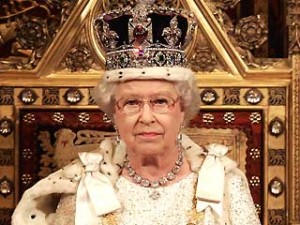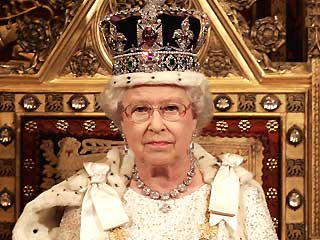 |
| In 40 years that Queen will miss the summit |
About 250 placard-carrying demonstrators blocked the train from leaving Anuradhapura and accused the journalists of supporting the defeated Tamil Tiger rebels.
Callum Macrae, director of Channel 4’s award-winning documentary, “No Fire Zone: Sri Lanka Killing Fields,” said police told him his team had to return to the capital, the BBC reported.
The BBC also reported police stopped from entering Colombo the buses of more than 100 Tamils whose family members disappeared during or after Sri Lanka’s civil war.
Sri Lanka’s Media Minister Keheliya Rambukwella said police prevented the Tamils from entering Colombo as a precaution against disruptions to the 3-day summit that starts on Friday.
“There were intelligence reports that this is a politically motivated protest and [if] these [Tamil] people came to Colombo during the summit, it would have led to a breach of the peace,” Rambukwella said.
Sri Lanka remains a dangerous place for journalists reporting on sensitive political issues, Reporters Without Borders said in a report published earlier this year. Sri Lanka ranked 162nd of 179 countries in the organization’s 2013 World Press Freedom Index.
In March Reporters Without Borders said state-owned Sri Lanka Broadcasting Corp. had been censoring retransmissions of the BBC’s Tamil-language broadcasts.
The Sri Lankan summit could be one of the most contentious Commonwealth gatherings in the 73-year history of the organization, made up of former British Empire colonies.
As host, Sri Lanka becomes chair of the biennial event until the next summit.
But the summit — officially the Commonwealth Heads of Government Meeting — in Colombo has been overshadowed by concerns over the human rights record of the army during and immediately after the end of the 26-year brutal conflict with Tamil rebels.
The Sri Lankan regular army defeated the Liberation Tigers of Tamil Eelam — the Tamil Tigers — who were fighting a guerrilla campaign to create an independent Tamil state called Tamil Eelam in northeastern areas of the island.
As many as 100,000 people are thought to have been killed in the civil war.
Since the war’s end in 2009 tensions have remained high during attempts to integrate Tamils into mainstream national life.
Human rights groups, freedom of speech organizations and the United Nations have criticized both sides about their treatment of civilians.
Just before the war ended, U.N. High Commissioner of Human Rights Navi Pillay said the number of civilian deaths was “truly shocking” and could reach “catastrophic” levels.
The Sri Lankan government later rejected the findings of a U.N. group investigating allegations of heavy civilian casualties at the end of the war, as well as two resolutions by the U.N. Human Rights Commission calling for an investigation of alleged war crimes.
However, in February 2012 Sri Lanka’s military appointed a five-member Court of Inquiry to look into civilian deaths allegedly at the hands of the army during the civil war.
The summit is seen by Commonwealth members as a window to display mostly economic progress and boost trade. Issues discussed also include international peace and security, democracy, sustainable development, debt management, education, environment and human rights.
A report by Sri Lanka’s Daily News in April quoted External Affairs Minister Gamini Lakshman Peiris saying the government has made great strides regarding reconciliation since 2009, despite attempts to destabilize the peace agreement.
Choosing Sri Lanka as the venue “is all the more satisfying because of the large resources at the command of the forces opposed to Sri Lanka,” Peiris said.
But Canadian Prime Minister Stephen Harper and his Indian counterpart, Manmohan Singh, later said they wouldn’t attend the summit because of concerns about human rights.
British Prime Minister David Cameron will attend but will ask “serious questions” and demand an investigation into allegations of war crimes.
British Foreign Secretary William Hague told the BBC it was right for Cameron to visit Sri Lanka and vital to raise “difficult questions.”
At the Commonwealth Business Forum this week, Sri Lankan President Mahinda Rajapaksa appealed for greater understanding by the Commonwealth’s more developed nations.
“For genuine and credible partnerships to be established for wealth creation, the more advanced nations need to be sensitive to the issues of the lesser-developed nations and must be honestly supportive of promoting trade with emerging nations,” he said.
This also will be the first time in 40 years that Queen Elizabeth II will miss the summit. Buckingham Palace announced her son, Prince Charles, will attend in her place because she has curtailed her overseas visits due to age — she is 87.
